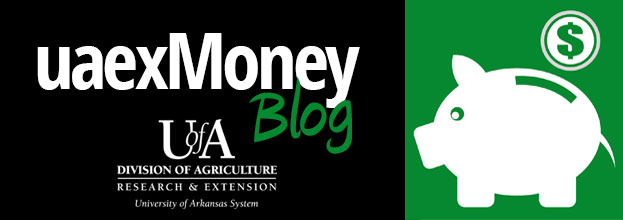UAEX Money Blog

UAEX Money
Six Important Steps for Consumer Protection
1. Guard personal information and PINS. Carefully guard social security number, bank account numbers, personal identification numbers, etc. Any financial documents
(including checks) that you keep at home should be in a secure location – preferably locked. Beware of calls or emails that ask for personal or financial information. Never
give out information over the phone unless you initiated the call or are certain that you are talking to a reputable person. If someone claims to be a relative or from your bank -
verify their identity. It’s okay to hang up and place a direct call to verify the identity of the caller. The National Do Not Call Registry is a free, easy way to reduce telemarketing
calls. To register or to get information, visit www.donotcall.gov, or call 1-888-382-1222 from the phone number you want to register. Don’t open files or click on links in emails
from someone you don’t know. Thieves use phishing scams to try to access your information. Cut back on the amount of legitimate marketing emails you receive by
contacting the Direct Marketing Association (DMA). Opt out of receiving unsolicited commercial email from DMA members at www.dmachoice.org. Registration is free and
lasts six years.
2. Shred mail and documents. Dumpster diving can give thieves access to bank statements, credit card statements, health insurance numbers, pre-approved credit card
offers, and other personal information. Shred anything that might have your personal financial information. Opt out of pre-screened credit card and insurance offers. Call 1-
888-5-OPT-OUT (1-888-567-8688) or visit www.optoutprescreen.com. Opt out of receiving unsolicited commercial mail from many companies for five years by registering
with the Direct Marketing Association (DMA). Your name will be put on a "delete" file and made available to direct-mail marketers and organizations. This registry applies only
3. Shop at reputable businesses. Whether in-person or online, one of the best ways to be sure you won’t be swindled is to shop at businesses you know are legitimate. If
shopping online, look for a physical address and phone number; check refund and return policies; read privacy and protection information. Pay by credit card. Under the
Fair Credit Billing Act, you’re financial responsibility is limited to $50 in the event that unauthorized charges are made on your credit card account. Keep records/receipts of
your transactions.
4. Keep devices secure. Do you shop or bank online? Have you used a mobile app to check your account balance? Do you receive email messages from your credit card
company? Make sure you keep virus software up to date. Log-out of accounts, exit websites and close apps as soon as you are finished. Password protect your phone,
tablet, or computer. Use strong passwords. Avoid obvious passwords such as your birthdate, address, maiden name, etc.
5. Limit the cards you carry. You’ll have less to lose if your purse or wallet is stolen. It’s easier to contact companies and stop transactions on only one or two cards than on six
or eight cards. Carry only the cards you need and leave the others at home. Leave your Social Security card at home. If the card-reading device at a gas-pump or ATM looks as if it’s been tampered with, don’t swipe your card.
6. Monitor accounts and statements. Keep a close eye on your bank accounts. Always check statements. View account information online and/or sign up for text alerts to
monitor more frequently. Check your credit report regularly. You are entitled to one free annual credit report from each of the three major credit reporting bureaus. Spread
these out over the year and check one every four months. Be sure to go to the right website: www.annualcreditreport.com. Other website may charge a fee. Your credit
report is free but there is a small fee ($10-$20) to obtain your credit score. Monitor your report for errors or signs of fraud. You can place an Initial Fraud Alert on your
report and creditors or business must verify your identity when anyone applies for credit in your name. The initial alert expires in 90 days but can be renewed. Victims of
proven fraud are allowed a 7 year fraud alert. Visit www.annualcreditreport.com and click on a link for any of the credit bureaus. Placing a fraud alert with one bureau
automatically places the alert with the other bureaus. Contact the bank, creditor, and/or credit bureau if you notice anything suspicious.